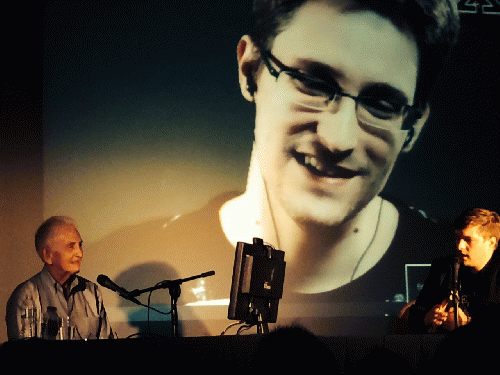
Left to right: Daniel Ellsberg, Edward Snowden, and Free Press Foundation moderator
(Image by Michael Collins) Details DMCA
The idea of prosecuting someone for revealing evidence of a crime has an odd ring to it. Revealing evidence of a crime is, in fact, criminal. Daniel Ellsberg
Being a patriot doesn't mean being obedient to authority. Oaths to authority are one of the most dangerous and corrosive things" If they expect us to stay silent [to massive violations of the Constitution], they shouldn't ask us to take the oath in the first place. " What we require, should encourage, are oaths to values. Edward Snowden
(New York City, Hope X Conference - 7/19) Daniel Ellsberg and Edward Snowden spoke to overflowing conference halls at the Hope X (Hackers On Planet Earth) conference in New York City today. Sponsored by 2600, the hacker's quarterly magazine, the hot topics at this tenth annual conference concerned freedom of the press and fighting government intrusion into the lives of digital activists and the rest of us. (The two presentations will be available from the Hope X archives. I highly recommend getting the DVD, available from the 2600 website in 10-14 days.)
Daniel Ellsberg was the conference keynote speaker. A former government official who leaked the explosive Pentagon Papers on the Viet Nam War, Ellsberg was billed as "the whistleblower of all whistleblowers" since he was the first government official to face prosecution for the common activity of leaking government information. He paid dearly for his efforts through FBI and other security agency harassment. However, his whistle blowing effectively undermined the political rationale for the Viet Nam War. Despite the harassment, Ellsberg remained a vigilant activist fighting for press freedom and transparency in government.
Ellsberg was clearly comfortable with the setting and himself. He offered some incredible insights and helped create a special collective energy through his interactions with Edward Snowden. He also showed a sharp and insightful wit through humor, some of which was self-deprecating.
Ellsberg started out with a point that can't be made often enough:
"The secrets of courts, like individuals, are always their defects."
The Pentagon Papers revealed the known defects of conduct during the Vietnam War. Forty years later, the material revealed by Chelsea Manning via Wikileaks, uncovered the defects of the War on Terror. Is it any wonder that the government goes after whistleblowers with a special vengeance?
Ellsberg noted that he was the first government official prosecuted under the Espionage Act for non-espionage activity - leaking - and that it took forty years for another whistleblower to emerge with sufficient evidence of defects to warrant a similar prosecution/persecution. The revelations of that whistle blower, Chelsea Manning, had an impact on both the United States and Iraq. Ellsberg told the audience that Manning revelations on the treatment of Iraqi prisoners assured an earlier departure date from Iraq for United States troops.
Ellsberg also offered his opinion on the intensity of actions against whistleblowers including Manning, Snowden, and Thomas Drake. Each of these individuals revealed evidence of criminal activity on the part of the government. Manning's revelations showed violations of the "Crimes Against Peace" clause of the Nuremberg Protocols.
Enter Edward Snowden
Snowden appeared live on a video feed from Russia, where he lives in asylum. As Snowden came on the video screens throughout Manhattan's Pennsylvania Hotel (that spilled over to Seventh Avenue in front of the hotel), Ellsberg was asked what he thought the first time he heard about Edward Snowden:
"Hope! I was pretty much losing hope that anyone would put out what needed to be put out."
Snowden immediately acknowledged Ellsberg as one of his key inspirations and thanked him for his service in and out of government. While they've never met in person, this virtual meeting was a clearly a very poignant moment between two of the very few people who had the courage to stand up to those who pervert the power of the United States government.
Ellsberg asked Snowden: "What did you have in mind when you did what you did?"
(Note: You can view every article as one long page if you sign up as an Advocate Member, or higher).




